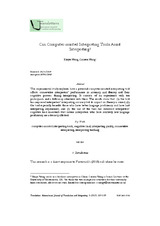Mostrar el registro sencillo del ítem
Can Computer-assisted Interpreting Tools Assist Interpreting?
| dc.contributor.author | Wang, Xinyu | |
| dc.contributor.author | Wang, Caiwen | |
| dc.date.accessioned | 2020-06-05T13:01:14Z | |
| dc.date.available | 2020-06-05T13:01:14Z | |
| dc.date.issued | 2019 | |
| dc.identifier.issn | 2605-2954 | |
| dc.identifier.uri | http://hdl.handle.net/10396/20123 | |
| dc.description.abstract | This experimental study explores how a potential computer-assisted interpreting tool affects consecutive interpreters’ performance in accuracy and fluency and their cognitive process during interpreting. It consists of an experiment with ten participants and a follow-up interview with them. The results show that: (1) the tool has improved interpreters’ interpreting accuracy but its impact on fluency is mixed; (2) the tool especially benefits those who have better language proficiency and have had interpreting experiences; and (3) the use of the tool has increased interpreters’ cognitive load insomuch that novice interpreters who have relatively low language proficiency are adversely affected. | es_ES |
| dc.format.mimetype | application/pdf | es_ES |
| dc.language.iso | eng | es_ES |
| dc.publisher | UCOPress | es_ES |
| dc.rights | https://creativecommons.org/licenses/by/3.0/ | es_ES |
| dc.source | Transletters. International Journal of Translation and Interpreting 3, 109-139 (2019) | es_ES |
| dc.subject | Computer-assisted interpreting tools | es_ES |
| dc.subject | Cognitive load | es_ES |
| dc.subject | Interpreting quality | es_ES |
| dc.subject | Consecutive interpreting | es_ES |
| dc.subject | Interpreting teaching | es_ES |
| dc.title | Can Computer-assisted Interpreting Tools Assist Interpreting? | es_ES |
| dc.type | info:eu-repo/semantics/article | es_ES |
| dc.relation.publisherversion | https://www.uco.es/ucopress/ojs/index.php/tl/index | es_ES |
| dc.rights.accessRights | info:eu-repo/semantics/openAccess | es_ES |

